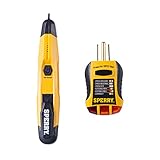You may have seen reports of RV hot skin issues in the news from time to time. It’s a real thing, and it can be extremely dangerous. So, we’re here to lay out the details on what the term “RV hot skin” means, how to test your RV for a “hot skin” condition, and how to avoid serious injury – or worse.
This is important, so let’s get right to it.
- 1) What Is RV Hot Skin?
- 2) What Causes Stray Voltage or “RV Hot Skin”?
- 3) Can I Be Electrocuted By RV Hot Skin?
- 4) Can a Brand New RV Have a Hot Skin Condition?
- 5) How Do You Test For “RV Hot Skin” or Stray Voltage?
- 6) Important Notes About RV Hot Skin and RV Electrical Safety From Electrical Engineers
What Is RV Hot Skin?
“Hot skin” is a term that was actually coined in reference to RVs that have a stray voltage issue that causes the exterior of the rig, including the frame, chassis, wheels, hitch, and attached tow vehicle to become electrified.
In RV circles, the term “hot skin” is used, but the term “stray voltage” is also common. They have the same meaning and can be used interchangeably.
In short, if the ground wire of an RV’s shore power feed is interrupted for some reason, normal current leakage inside the RV can create a stray voltage situation that encompasses the entire RV (and any tow vehicle attached to it).
This stray voltage can provide a low current which would cause you to feel a tingling sensation upon touching the rig. However, it can also provide a very high current that can not only knock you off your feet but COULD kill you. And yes, this has happened.
An acceptable neutral-to-ground voltage is 2V AC or less at a receptacle, with 5V being the upper limit. Typically the “skin” and chassis of your rig sit within about 5 volts AC of the earth.
The ground wire in your shore power cord is connected to the one in the power pedestal and is supposed to keep the current at this safe voltage.
However, if the ground wire in your electrical connection is broken or even loose, that voltage can rise significantly to 30V or 60V – or potentially even to as high as 120V.

If an RV is plugged into an improperly wired outlet, or if the RV itself is improperly wired (including the failure of a connection or wiring), RV hot skin can occur.
Any current over 30 volts can be extremely dangerous to the heart. So, if in running a voltage test you were to detect 30 volts or greater, you need to carefully disconnect your RV immediately, and deal with the issue. (See potential causes of RV hot skin below.)
IMPORTANT NOTE: When an RV’s shore power grounding system is properly established, it isn’t possible for any voltage at all to show on the chassis (“skin”) of the RV. So, if you find a stray voltage of more than 2 or 3 volts when testing your RV, this would indicate that you’ve lost your shore power safety ground.
What Causes Stray Voltage or “RV Hot Skin”?
Dangerous electrical voltage on an RV (“RV hot skin”) can be caused by an RV that is improperly grounded. This could occur if you’re using a bad extension cord, are plugged into a campsite power pedestal that’s improperly wired, or if the RV’s electrical system hasn’t been properly maintained and has broken wiring somewhere that has led to a broken ground system within the RV.
- Bad extension cord
- Plugged into an improperly-wired campsite power pedestal
- Broken wires/ground system within the RV
Can I Be Electrocuted By RV Hot Skin?
You absolutely CAN be electrocuted by an RV, and unfortunately, it has happened. So, RV hot skin presents an extremely dangerous situation.
In addition to a hot skin/stray voltage condition, you can also be shocked if you use the wrong (or a defective) extension cord or dogbone adapter, or if you fail to use a surge protector or a proper RV battery disconnect switch.
This may be a good time for a review of what you need to know about your RV power cord, as well as a refresher on how to hook up an RV. Our post about dogbones and plugging in an RV is another good post to review in a discussion about RV hot skin.
Can a Brand New RV Have a Hot Skin Condition?
Yes! RV hot skin can occur on a brand new RV. The age of an RV is not a determining factor here. Stray voltage conditions have been identified on new rigs and on old rigs.

Even a brand spanking new RV can have a dangerous hot skin condition if it’s plugged into an improperly wired outlet, or if the RV itself is improperly wired.
Regardless of the age of the RV, if it’s plugged into an improperly wired outlet, or if the RV itself is improperly wired (including the failure of a connection or wiring), RV hot skin can occur.
How Do You Test For “RV Hot Skin” or Stray Voltage?
The safest (and easiest) way to test for stray voltage on an RV (or “RV hot skin”) is by using a Non-Contact Voltage Tester (NCVT).
The testing method is safe because you don’t need to touch the RV to check for stray voltage.
Here’s how it works: You’ll turn on your NCVT and point it a few inches away from any metal part of the RV. If the RV is energized, when your NCVT comes within a few inches of it, the light on the NCVT will start blinking and the instrument will start beeping to warn you of the voltage.
The blinking and beeping may even begin as you step within a couple of feet of the rig or from even further away. The blinking and beeping alert you to the fact that the RV chassis/skin has up to 120 volts of stray voltage, which could be life-threatening.
Non-Contact Voltage Tester
- VERIFIES VOLTAGE PRESENSE: Verifies the presence of AC Voltage prior to working on electrical installation or troubleshooting (GFI6302 and VD6504)
- DURABLE: Hi-Impact Resistant ABS housing with soft over-molded rubber grips with a compact ergonomic design (GFI6302 and VD6504)
Important Notes About RV Hot Skin and RV Electrical Safety From Electrical Engineers
Mike Sokol, the founder of RVElectricity.com and an electrical engineer for 40 years, has been educating RV owners on safety issues related to electrical matters for many years.
“If you ever feel the slightest tingle or shock from your RV, that is a warning that something has happened to your grounding system and you do have a hot skin condition.”
– Mike Sokol
RVElectricity.com
Here are several articles from Mike Sokol on RV Hot Skin / Stray Voltage.
And here’s our dear friend Tom Morton, also an electrical engineer, with some extremely important words regarding RV electrical safety. This video is well worth the 22 minutes you’ll invest in watching it, especially because it contains potentially life–saving information:
Geek Out with Us Every Week
Join our newsletter to learn about all things RV-related. Every week we offer free tips, tricks, product reviews, and more to our online community of RVers. So, whether this is your first time on the road or you’re a seasoned expert, we’d love for you to geek out with us!



John S.
Thursday 4th of April 2024
Never had "RV hot skin" but I do have a Non-Contact Voltage Tester (NCVT) tester in the tool box just in case my fellow RVers need to check for their tingles.
TheRVgeeks
Friday 5th of April 2024
Hopefully you never need to use it, John.
GaryT
Thursday 4th of April 2024
Back in the 1950s l travelled with my grandparents in the summers. When we hit a new park l would round up 3 -4 boys to show them my trick. We would hold hands and l would touch our Airstream. The boy on the end would feel the shock. We thought it was great fun. After reading this post, maybe not!
Bridget
Friday 23rd of June 2023
I’ve never heard of this until now and I’m terrified. We are living in our rv in our yard because of mold in our house. We are plugged in with extension cords to the garage, and the house and garage are not grounded. My son had said he felt a weird sort of shock on the steps before. What do I do?!
TheRVgeeks
Friday 23rd of June 2023
Oh boy, Bridget. That's not good. Firstly, disconnect from the power right away to avoid the potential of something serious going wrong. And then it's a matter of trying to locate where the power is managing to make contact with the frame/chassis of your RV. If you're not comfortable/able to diagnose further, then get a qualified RV technician or mobile tech out to try and identify the source.
Brandon Buck
Wednesday 10th of May 2023
I also have a bad hot skin issue with our toy hauler. As high as 98v going from chassis to earth. My youngest was electrocuted when he climbed on the ladder in his bare feet after a rain, luckily his brother realized what was happening and knocked him off it. I have been trying to figure this out ever since. Let me start here it has been unplugged ever since unless I’m trying to diagnose. It doesn’t shock you when running the generator but always does on shore power. Last fall I was winterizing it climbed up a aluminum ladder and grabbed the antenna to put it down and it shocked the crap out of me. I climbed down checked that it wasn’t plugged in it was not so I climbed back up thinking it was in my head somehow grabbed the antenna again it about knocked me off the ladder. It also ruined some of my electronics on my tow pig. Please help somebody we want to go camping again thank you
Greg B
Sunday 24th of April 2022
i have experienced hot skin and yes i did feel it, i took a volt meter and stuck the negative into the wet grass and the positive to the trailer frame and found 60 volts, yes i got lucky, the problem was i plugged the trailer in to my garage 110v receptacle but it was the old wiring 2 prong no ground, installed new wiring with 3 prong and problem fixed, be careful what you use
TheRVgeeks
Sunday 24th of April 2022
Yikes, Greg! Glad you caught it WITHOUT getting shocked too badly! It can get dangerous, fast!